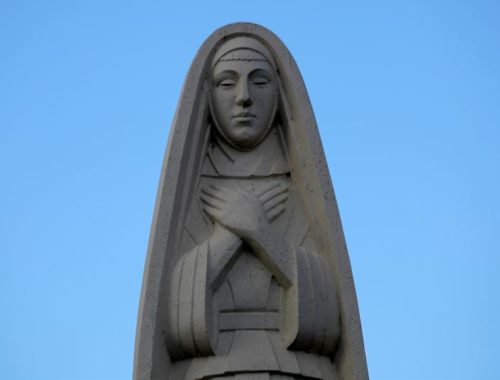I grew up believing that the only way of viewing the act of the Cross was through what I now know is called “penal substitution atonement theory.” The day I discovered that there are other atonement theories . . . well, it’s fascinating. Today’s guest post, from a friend, explores an approach to the Atonement that doesn’t rely on penal substitution, satisfaction, or ransom theory– some of the more historically popular theories.
~~~~~~~~~~~~~~~~~~~~~
I grew up Reformed, and the default teaching was penal substitution as our central understanding of the cross. “The cross is God’s response to man’s nature.” It’s straightforward, it’s simple, and it’s reflected in a lot of our hymns and doctrinal understandings.
In reading the gospels, though, I’ve been thinking about other ways of looking at it, wondering if there are other understandings that could be useful.
The parable of the wicked tenants (Mark 12) is one such example. The meaning of the parable is rather obvious, of course: the tenants are the Jewish leaders, the servants sent by the owner of the vineyard are the prophets, the son is Jesus, and so on. Because the point has more to do with the replacement of the Jewish order, we wouldn’t necessarily expect to have penal substitution worked into the mix. Nonetheless, it got me thinking. Why can’t this parable teach us something about the cross as well?
One thing that bothers me is how easily we skip over some of Jesus’s final words: “Father, forgive them; they know not what they do.” If the people who crucified Jesus were merely pawns in the Father’s judgment of sin, then this statement is almost a bygone conclusion. Obviously they don’t know what they’re doing; they aren’t really the ones doing it, so it’s natural that Jesus would want to forgive. I think maybe it’s more than that.
Penal substitution says, “The cross is God’s response to man’s nature.” But with the parable of the tenants and similar passages, couldn’t we also say, “The cross is man’s response to God’s nature?” That doesn’t seem so far out. Jesus showed us divine nature, so we killed him, because that’s our response to what’s pure and good: we hate it.
If I may propose a parable of my own….
~~~~~~~~~~~~~~~~~~~~~~
There once was a wise man who served as the mayor of a city. He was fair and just, and the people of the city were glad he was their mayor.
In the city, there was a young man who the mayor employed as a janitor to help keep the city hall clean. The young man had a problem, though: he was a drug addict.
The young man ran up a huge debt with drug dealers in the city. Desperate, he went to the mayor and confessed, asking to borrow money and promising to go to rehab. Though the mayor knew who the drug dealers were and was fully capable of stopping them directly, he agreed to loan the young man the money.
The young man paid off his debt to the drug lords and went to rehab as promised, but he soon left. The mayor invited the young man over for drinks at his house, encouraging him to stay clean. But before too long, he regressed. In less than six months, he had already racked up tens of thousands of dollars in debt and the drug dealers were harassing him daily.
The cycle repeated. He went to the mayor, begged for a loan and promised to stay clean. But when the consequences disappeared, so did his impulse to follow through. Still, the mayor kept loaning him money each time he asked, knowing full well that it wouldn’t be paid back.
Even in the middle of each cycle, the young man wondered why the mayor didn’t simply bust the dealers. It wouldn’t be hard, and it would solve the problem, wouldn’t it? Of course, he didn’t realize that his repeated return to drugs answered the question. The problem wasn’t the drugs; the problem was his addiction to them.
Each time, the cycle got worse. Greedy, the drug dealers began placing a bounty on the young man’s head every time he ran up a tab, knowing that it would make the money come faster and faster. Finally, after running up a particularly large debt, the dealers simply kidnapped the young man outright.
When the young man called the mayor to beg him for money once again, the mayor refused for the first time. “No, this has gone on long enough. This time I’m sending my son. He’ll take care of the dealers.”
The young man felt a surge of hope. The mayor’s son was head detective at the city police station and had personally busted many notorious dealers. The addict was certain that the son would come in guns blazing and rescue him, getting rid of the drug lords for good.
The dealers didn’t think it would happen. “He’s bluffing. No way he cares enough about you to send in the big guns.” They were certain it was all a bluff right up until the moment that they heard gunfire outside. Moments later, the doors flew open and the mayor’s son walked in.
Cowed, the dealers hung back. Surely they had bitten off more than they could deal with this time. They were in deep trouble now.
The mayor’s son pulled up a chair and sat down with the young man. “Listen. I’m here to put an end to this once and for all. You can’t keep going back over and over and over again; you’re just going to end up killing yourself. My father doesn’t care about the money you owe him. My men have this place surrounded; all you have to do is come with me.”
The young man was ecstatic. This was what he had been waiting for! Finally, these thugs were going to get what was coming to them. It was all about to be over.
The mayor’s son continued. “My father’s house has a lot of room; we want you to come back with me and live there. We’ll get you cleaned up, we’ll help you through withdrawals. You’ll be safe, and you’ll never have to look at or see drugs ever again.”
The addict’s face began to change. Getting out of his mess? Great news. Seeing the drug dealers get busted? Awesome. But the rest of it….he wasn’t so sure.
The drug dealers noticed this. They also noticed that the mayor’s son wasn’t carrying a gun, wasn’t wearing a ballistic vest. He was just an ordinary man.
The son was still talking, but the addict wasn’t listening any more. He hadn’t had any drugs in a while and he was starting to feel shaky. Did he really want this? He wanted to escape his predicament, but getting clean for good….not so much. But if he didn’t get out now, they would kill him.
One of the dealers saw his chance. Grabbing the mayor’s son by the back of the neck, he threw him onto the ground and aimed a gun at his head. “Who’s the big detective now, huh? You’re not so tough without all your guys, are you?”
Another dealer grabbed the young man. Grinning, he pushed a gun into his hand. “It’s either him or you, boy. Somebody has got to die. Who will it be?”
The young man realized he was pointing a gun at the son. What was he doing? But something else rose up inside him….anger. The mayor and his son — they were so perfect, like they were so far above him, like there was something wrong with him. Who did they think they were, anyway? It was fine when the mayor was just bailing him out….but coming in and telling him that he had to get clean once and for all? He was seething.
“Do it,” whispered the dealer. “Do it, and your debt is gone. You’ll never owe us many again; we’ll give you all the drugs you want. We’ll even set you up to deal a little bit yourself. You’ll be one of us. Just pull the trigger.”
The son didn’t say anything. He waited to see what the young man would do.
The addict began to curse, railing angrily. “Who do you think you are? You think that just because you’re important you can come in here and tell me what to do, how to live my life. You’re not so great. Screw you! Screw you and your fancy house and your perfect life and everything else about you. You know what? It’s my life, and I’ll do what I want!”
The young man pulled the trigger again and again, watching the son’s body buck as the bullets tore through his chest. The slide locked open as the last round was ejected.
Blood was trickling out of the son’s mouth as he took one ragged breath. “I….forgive you.” Then his eyes rolled back in his head and he slumped back.
Something snapped inside the young man’s head. What….why? Why would he say that? He was on the other side now. Didn’t this prove that he wanted nothing to do with the mayor or his son? But if he was really on the side of the drug dealers now, why would the son have forgiven him? And why did he feel so…wrong?
The dealers missed it completely. They laughed, taking the gun back and clapping the addict on the back racously. One of them kicked the son’s body into the corner and began dousing it in gasoline. “Let’s get out of here, man! Burn this place to the ground!”
The young man ran.
He didn’t know where he was running. He didn’t even realize that he was running until the cold night air hit him, rushing into his lungs like ice water. But he kept running, running as hard and as fast as he could. Anything to get away from that Man who had said, “I forgive you.”
He realized he was weeping as he ran, his lungs aching as sobs wracked his frame. Suddenly, he could run no more, and he fell to his knees as he continued to weep.
A pair of headlights appeared around a bend ahead of him. The car drove closer….then stopped. The driver door opened.
To the young man’s horror, he realized it was the mayor walking toward him. In the glare of the headlights, he realized his hands were red with blood. It must have splattered up from the son’s body, he realized.
“No, no — stay away from me!” The young man was terrified.
“I sent my son,” said the mayor. “Did you follow him?”
“Just leave me alone,” stammered the young man. “You don’t know what I did.”
The mayor looked down at the young man. He saw his son’s blood on the addict’s hands, the tears on his cheeks, heard the hoarse, ragged sound of his breath.
“Yes, I know what you did. And I forgive you too.”
~~~~~~~~~~~~~~~~~~~~
Editors note: For more on atonement theory, I highly recommend Morgan Guyton’s post at Mercy, not Sacrifice, and Sarah Moon’s on “The Cross and Radical Activism.”



